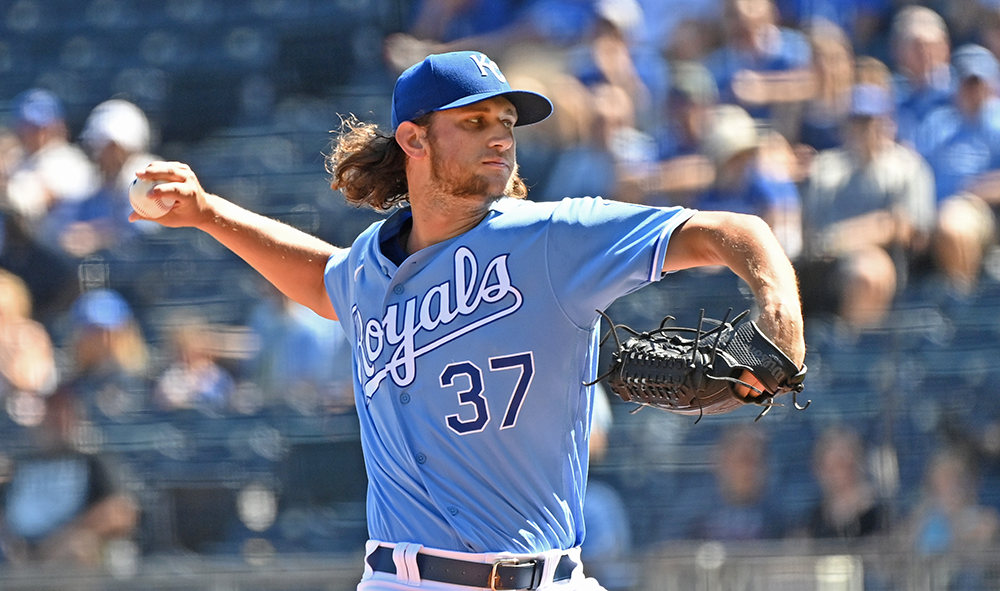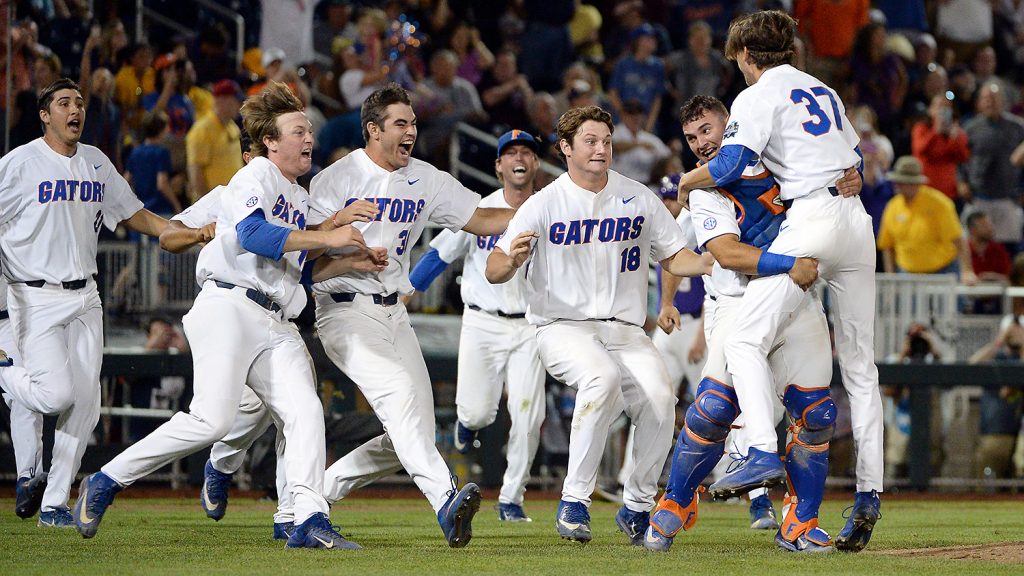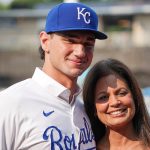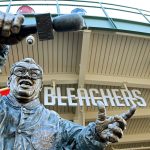
Gators in the Pros: After Highs at UF, Jackson Kowar Working His Way Back for Mariners
PEORIA, Ariz. — Seattle Mariners right-hander Jackson Kowar has experienced the highest of highs and the lowest of lows in his baseball career.
Nearly a decade removed from playing a key role in the Florida Gators 2017 national baseball championship, Kowar is still trying to find his place with his third MLB organization.
Kowar was selected in the first round of the 2018 MLB Draft by the Kansas City Royals a year after posting a 4.08 ERA and 84 strikeouts in 19 games. He made his MLB debut in June 2021 and spent three rocky seasons in Kansas City, where he recorded an ERA north of nine in 74 career innings.
He found himself traded twice in three weeks after the 2023 season, first to Atlanta and then Seattle, where he sustained a UCL injury at spring training the following year. Kowar has spent the last 14 months working his way back and anticipates making his return to an MLB mound sometime during the 2025 campaign.
Sports@CJC spoke with Kowar at the Mariners’ spring training facility in Peoria in March. Kowar reflected on his days at Florida and the journey he has endured on his road back to the big leagues. The following interview has been lightly edited for length and clarity.
1. Let’s go back to those days in the Orange and Blue and the 2017 team that won it all. What’s the first thing you think about when you think of that championship team?
Kowar: Probably my house. I remember it was whenever I think about those years. We had a little broken-down house on University Avenue right across from the golf course. Our old house had cracks in the wall. Me and [Brady] Singer lived in the same house, and so we had so much fun.
I think about that being what set that team apart. It’s that we were really close. I mean, obviously the team’s talented every year, so it’s kind of the small little in between details, and I think that that team was super, super close, which made a big difference.
2. What it was like to be under Kevin O’Sullivan and the coaching staff at Florida, and how did they craft you into the professional that you are today?
Kowar: I loved it. I think the thing that they probably do as well as anybody is they treat you like professionals. I think that was a big drawing point for me and something that I had a lot of success in under that system. It’s ownership on you. It’s a lot less holding your hand. It’s a lot more about, ‘Hey, if this is something you say you want to do, then it’s going to be the fruits of your labor, not me.’ If you want to be a pro, then it’s up to you.
I think the best thing that Sully does is create a culture where there’s a lot of competitive people in one spot. I think for me, that’s exactly what I needed at that time in my life to be around A.J. Puk, Logan Shore, Dane Dunning, Shaun Anderson, Kirby Snead, Brady Singer or Alex Faedo. There are 10 big league pitchers on the team around there.
Sully just let that environment be. He didn’t try to micromanage us. He let those guys craft the environment. So, when you’re young, and it’s a player led culture, I think that’s easy to be empowered and to take your own steps and to make it your own career.
3. In Game 3 of the 2017 College World Series, you are on the doorstep of a championship, and Kevin O’Sullivan gives you the ball for your first and only relief appearance of that season to close it out. What did that moment give you in terms of confidence, him giving you the ball with a chance to secure it all?
Kowar: I wish I had a better story. The truth of the situation is, I threw in the regionals. I think Marist scored eight runs off me, and then I lost the Super Regional game, and then I lost our first game to TCU. So, I was just begging for another chance.
I remember I went up to Sully before the game, and I wish it was more of a heroic thing, but I was just like, ‘I’m tired of sucking, can I have one more chance?’ We were definitely a little bit on fumes. Our closer, Michael Byrne, had had to have thrown 30 innings in the postseason. He had thrown against LSU a bunch already that year, so I figured if he could kind of get us there, and we needed someone to get those last outs, I could bridge the gap.
So, a lot of it was just everyone else was doing so well and I kind of felt left out. We had thrown Byrne so much, so I saw a little opportunity. I went up to Sully, and said ‘if there’s a chance, please. I’d love another chance’ because I hadn’t thrown that well up to that point in postseason. So fortunately, the situation aligned, and it worked out great.

4. Take me through that final out, every second of it for you.
Kowar: I was much more nervous. I came on in the eighth inning with [a] runner on third and one out. We were up one (2-1) at that point, so that was really tight. Fortunately, the boys tacked on four runs after I got out of that eighth inning.
Going back out for the ninth, I knew we were up five runs at that point. I had a little more time to think about what I wanted to do. I had some big celebration planned, and I just blacked out. I remember it was the first pitch. I thought I wanted to strike him out, and he put it in play immediately. I half covered first. I watched the video, and I don’t remember anything except for being on the bottom of the pile, pretty much.
5. These last couple of years have been challenging for you: the struggles in Kansas City, the Tommy John Surgery. What have you learned about yourself, especially going through the rehab process?
Kowar: Rehab is definitely different. I think it’s been a big learning experience for me, as far as being a lot less externally motivated. I had a lot of success early, so I got a lot of happiness and purpose from doing successful things that didn’t translate, especially at the big-league level. I think that was tough for me. And then when you get into rehab, it’s a lot more about the process.
You’re not going to get a lot of those external validations, clearly, because I was here [in Arizona] all summer. You win small victories. A lot of it was being thankful for the process. Process goals, small goals, small victories when it’s just you. That’s something that I’ve had to flip my head around. It’s not necessarily all about big external goals that you hit in front of everybody. I think the process has been a lot stronger for me.
I take a lot more pride in that, as opposed to just putting all my eggs into the basket of ‘when I’m out there, I want to perform’ and being able to do that with no one watching. I think that’s going to prepare me a lot more for this upcoming season, where I feel like I’m in a much better spot, as opposed to just getting all my joy and happiness out of trying to do well out there and sometimes not being as prepared as I probably could have been. I feel the opposite, where I’ve gotten a lot of joy and happiness out of being really diligent in my process.
I think that’s going to be a big factor and I’m itching to get back, but it’s kind of back to that same thing where I have got to be diligent with these small baby steps these next months before I’m back.
6. What wisdom would you share with pre-MLB draft Jackson Kowar from your time in professional baseball?
Kowar: I think I had a lot of admiration and almost too much respect for major leaguers. I think I got up and I probably was a little too deferential. I won’t say nervous, but I wanted to have my hands back and just take it all in. I think I wasn’t ready to compete at that level just yet.
I think that’s probably my biggest regret. I probably gave hitters too much credit and was worried a little bit too much about who was standing in the box and not about competing. That’s something I got over relatively quickly, but especially that first year when I struggled. I think that was probably my biggest issue, where I was just so excited to be in the big leagues. I was giving guys too much credit and trying to nibble a little too much and be too fine.
7. What opportunity do you see for yourself this year in Seattle?
Kowar: I think [the Mariners] have been really, really close to the postseason and I could see that playing against them when I was in Kansas City. I think pitching in October is a big opportunity that I’m looking forward to. The pitching staff is so solid with the rotation. With Kansas City, I was the fifth starter and had a little uncertainty in my role. That is not the case here. We have a great rotation. Those guys are phenomenal.
For me, just coming out of the bullpen strictly feels like a much more settled role, which is little easier to embrace. And then for me, the goal would just be getting healthy, taking care of these last two months of rehab, being very diligent with that. So, when October rolls around, I’ll be full go.
8. What are your thoughts on the new automatic balls and strikes system MLB is testing here in Spring Training?
Kowar: I had it a lot in 2023 when I was in AAA. I don’t mind it necessarily. As someone who really likes catchers, I do think I worry a little bit because I think there’s a real art form to it. It is what makes guys like Cal [Raleigh], for instance, really good. There’s a human element to the game.
I think the challenge system is fun, if it’s in a limited capacity. I don’t hate it, but you definitely don’t want to take away that the human element of the game. Aside from the hitter he is, I love the value that Cal has as a catcher. I feel like’s it’s coming [to the Major Leagues], but I want it to be limited so we don’t lose all the value of the receiving catchers.
9. Have you had the chance to talk to Ichiro at camp?
Kowar: I usually leave him alone. He’s pretty diligent. But a couple days ago, I talked to him a little bit. He could still play. He goes through the full warm up on the turf. I was next to him and we chopped it up. It’s pretty cool.
Randy Johnson was in town the other day. It’s like I said, I don’t want to give guys too much credit. Those are the guys. When I’m around them, I’m like, ‘alright, this is awesome, Ken Griffey Jr. or Randy Johnson’s in town’, so it’s hard not to not to smile. You can’t not be a little kid when you’re looking at those guys.
More Gators in the Pros:
* Now a Red, Brady Singer Shaped By Time at UF
* Jonathan India Adjusting to Life With Royals After Trade
* A.J. Puk Starting to Feel Comfortable in Deep D’backs ‘Pen
* Dane Dunning on Winning a World Series, His Time With UF
Category: Cactus League, Gators in the Pros, Seattle Mariners
Tagged: Florida Gators Baseball Gators in the Pros Jackson Kowar Kevin O'Sullivan MLB Spring Training Seattle Mariners


